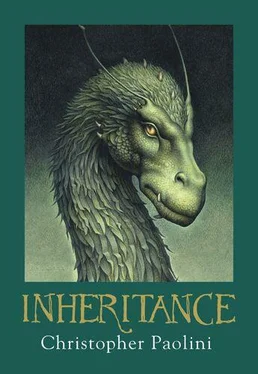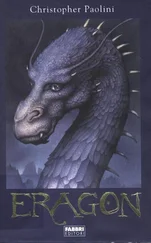If the warriors responded, he did not hear, for he was already moving. Behind him, another stone crashed into the fighting armies, causing even more screams of pain.
The street Roran had chosen was full of soldiers, as well as a few elves and werecats, who were clumped together by the front door of a hatter’s shop, hard-pressed to fend off the large number of enemies around them. The elves shouted something, and a dozen soldiers fell to the ground, but the rest remained standing.
Diving into the midst of the soldiers, Roran again lost himself in the red-tinged haze of battle. He leaped over one of the fallen soldiers and brought his hammer down on the helm of a man with his back turned. Confident that the man was dead, Roran used his shield to shove the next soldier back and then jabbed with the end of his hammer at the man’s throat, crushing it.
Next to him, Delwin caught a spear in his shoulder and went down on one knee with a cry of pain. Swinging his hammer even faster than normal, Roran drove back the spearman while Delwin pulled the weapon out and got back to his feet.
“Fall back,” Roran told him.
Delwin shook his head, teeth bared. “No!”
“Fall back, blast you! That’s an order.”
Delwin cursed, but he obeyed, and Horst took his place. The smith, Roran noticed, was bleeding from cuts on his arms and legs, but they did not seem to interfere with his ability to move.
Evading a sword thrust, Roran took a step forward. He seemed to hear a faint rushing sound behind him, and then a thunderclap went off in his ears, and the earth spun around him and everything went black.
He woke with a throbbing head. Above, he saw the sky-bright now with light from the rising sun-and the dark underside of the crevice-lined overhang.
Groaning with pain, he pushed himself upright. He was lying at the base of the city’s outer wall, next to the bloody fragments of a stone from a catapult. His shield was missing, as was his hammer, which concerned him in a befuddled sort of way.
Even as he tried to regain his bearings, a group of five soldiers rushed at him, and one of the men stabbed him in the chest with a spear. The point of the weapon drove him back against the wall, but it did not pierce his skin.
“Grab him!” shouted the soldiers, and Roran felt hands take hold of his arms and legs. He thrashed, trying to wrench free, but he was still weak and disoriented, and there were too many soldiers for him to overpower.
The soldiers struck at him again and again, and he felt his strength fading as his wards shielded him from the blows. The world grew gray, and he was about to lose consciousness again when the blade of a sword sprouted from the mouth of one of the soldiers.
The soldiers dropped him, and Roran saw a dark-haired woman whirling among them, swinging her sword with the practiced ease of a seasoned warrior. Within seconds, she killed the five men, although one of them managed to give her a shallow cut along her left thigh.
Afterward, she offered him her hand and said, “Stronghammer.”
As he grasped her forearm, he saw that her wrist-where her worn bracer did not cover it-was layered with scars, as if she had been burned or whipped nearly to the bone. Behind the woman stood a pale-faced teenage girl clad in a piecemeal collection of armor, and also a boy who looked a year or two younger than the girl.
“Who are you?” he asked, standing. The woman’s face was striking: broad and strong-boned, with the bronzed, weather-beaten look of one who had spent most of her life outdoors.
“A passing stranger,” she said. Bending at the knees, she picked up one of the soldiers’ spears and handed it to him.
“My thanks.”
She nodded, and then she and her young companions trotted off among the buildings, heading farther into the city.
Roran stared after them for a half second, wondering, then shook himself and hurried back along the street to rejoin his battalion.
The warriors greeted him with shouts of astonishment and, heartened, attacked the soldiers with renewed vigor. However, as Roran took his place along with the other men from Carvahall, he discovered that the stone that had struck him had also killed Delwin. His sorrow quickly turned to rage, and he fought with even greater ferocity than before, determined to help end the battle as soon as possible.
Afraid but determined, Eragon strode forward with Arya, Elva, and Saphira toward the dais where Galbatorix sat relaxed upon his throne.
It was a long walk, long enough that Eragon had time to consider a number of strategies, most of which he discarded as impractical. He knew that strength alone would not be enough to defeat the king; it would require cunning as well, and that was the one thing he felt he most lacked. Still, they had no choice now but to confront Galbatorix.
The two rows of lanterns that led to the dais were wide enough apart that the four of them were able to walk side by side. For that Eragon was glad, as it meant Saphira would be able to fight next to them if need be.
As they approached the throne, Eragon continued to study the chamber around them. It was, he thought, a strange room for a king to receive guests in. Aside from the bright path that lay before them, most of the space was hidden within impenetrable gloom-even more so than the halls of the dwarves beneath Tronjheim and Farthen Dur-and the air contained a dry, musky scent that seemed familiar, even though he could not place it.
“Where is Shruikan?” he said in an undertone.
Saphira sniffed. I can smell him, but I don’t hear him .
Elva frowned. “Nor can I feel him.”
When they were perhaps thirty feet from the dais, they halted. Behind the throne hung thick black curtains made of velvety material, which stretched up toward the ceiling.
A shadow lay over Galbatorix, concealing his features. Then he leaned forward, into the light, and Eragon saw his face. It was long and lean, with a deep brow and a bladelike nose. His eyes were hard as stones, and they showed little white around the irises. His mouth was thin and wide with a slight downturn at the corners, and he had a close-cropped beard and mustache, which, like his clothes, were black as pitch. In age, he appeared to be in his fourth decade: still at the height of his strength, yet near the beginning of his decline. There were lines on his brow and on either side of his nose, and his tanned skin had a thin look to it, as if he had eaten nothing but rabbit meat and turnips through the winter. His shoulders were broad and well built, and his waist trim.
Upon his head was a crown of reddish gold set with all manner of jewels. The crown appeared old-older even than the hall, and Eragon wondered if perhaps it had once belonged to King Palancar, many hundreds of years ago.
On Galbatorix’s lap rested his sword. It was a Rider’s sword, that much was obvious, but Eragon had never seen its like before. The blade, hilt, and crossguard were stark white, while the gem within the pommel was as clear as a mountain spring. Altogether, there was something about the weapon that Eragon found unsettling. Its color-or rather its lack of color-reminded him of a sun-bleached bone. It was the color of death, not life, and it seemed far more dangerous than any shade of black, be it ever so dark.
Galbatorix examined them each in turn with his sharp, unblinking gaze. “So, you have come to kill me,” he said. “Well then, shall we begin?” He lifted his sword and spread his arms to either side in a welcoming gesture.
Eragon widened his stance and raised his sword and shield. The king’s invitation unsettled him. He’s playing with us .
Still keeping hold of the Dauthdaert, Elva stepped forward and began to speak. However, no sound came from her mouth, and she looked at Eragon with an expression of alarm.
Читать дальше





![Christopher Paolini - Brisingr [en]](/books/195528/christopher-paolini-brisingr-en-thumb.webp)
![Christopher Paolini - Eldest [en]](/books/223279/christopher-paolini-eldest-en-thumb.webp)
![Christopher Paolini - Eragon [en]](/books/248440/christopher-paolini-eragon-en-thumb.webp)




